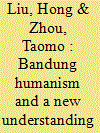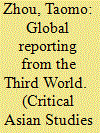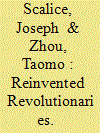|
|
|
Sort Order |
|
|
|
Items / Page
|
|
|
|
|
|
|
| Srl | Item |
| 1 |
ID:
139552


|
|
|
|
|
| Summary/Abstract |
From 1960 until 1965, the People's Republic of China (PRC) built a remarkably cordial quasi alliance with the Republic of Indonesia. At the same time, however, the years between 1960 and 1965 were marked by two large waves of anti-Chinese movements in Indonesia. Although more than half a century has passed since these events, our understanding of Chinese foreign policy towards Indonesia during these turbulent years remains incomplete. In 2008, the Chinese Foreign Ministry Archives declassified for the first time documents produced during the years between 1961 and 1965. However, very recently in summer 2013, the Chinese Foreign Ministry Archives re-classified the main body of its collection. Through examining this body of fresh but currently inaccessible official records, this article aims to bridge the gap between scholarly works on the PRC's diplomatic history and overseas Chinese history. By tracing the processes by which Chinese diplomats dealt with Sukarno, the ethnic Chinese in Indonesia, and the Communist Party of Indonesia (Partai Komunis Indonesia, or the PKI), this article argues that the ambivalent Chinese alliance with Indonesia was shaped by three disparate pressures which interacted and competed with one another: the strategic need to befriend Third World countries, ethnic ties to the Chinese in Indonesia and ideological commitment to the international communist movement.
|
|
|
|
|
|
|
|
|
|
|
|
|
|
|
|
| 2 |
ID:
164675


|
|
|
| 3 |
ID:
164681


|
|
|
|
|
| Summary/Abstract |
Originating from the 1955 Bandung Conference, the Afro-Asian Journalists’ Association (AAJA) promoted international collaboration among journalists in newly independent countries. Built on an inclusive foundation of peaceful co-existence, the AAJA contributed to the development of expansive global information networks, lively intellectual traffic, and rich visual arts among Afro-Asian nations. However, the cosmopolitanism of its early years was later undermined by the decline of constitutional democracy in Indonesia and a lack of cohesion among Afro-Asian nations. After the September Thirtieth Movement in Indonesia in 1965, the AAJA relocated to Beijing and was mobilized by the Chinese state to promote the P.R.C. as the leader of an embittered Third World’s battle against American imperialism and Soviet revisionism. In the early 1970s, ideological fervor began abating in China. During this time, Mao’s reframing of the three worlds, which was based on developmental measurements, redirected the AAJA’s Third World discourse to issues of modernization until its quiet dissolution in 1974. The history of the AAJA demonstrates the complex and often conflicted ways in which two important post-colonial states – Indonesia and China – conceptualized “the Third World” and formulated media representations during the Cold War.
|
|
|
|
|
|
|
|
|
|
|
|
|
|
|
|
| 4 |
ID:
180344


|
|
|
|
|
| Summary/Abstract |
There is an abruptness to exile. Exile is defined far less by our distance from any particular place or people and far more by the consciousness that they are irrevocably unreachable. In counterpoint, our sense of cosmopolitanism rests not in the act of travel but in its possibility. It is for this reason, the curtailment not simply of travel but also the imagined possibility of travel, that the Covid-19 pandemic has bred a sense of exile around the globe. Even if we are now trapped in what we would regard as home, many of us nonetheless have a jarring sense of fixity, a feeling that we are exiled global citizens. We necessarily and often unconsciously adapt our routines and habits—and imperceptibly but ineluctably our goals and beliefs will change as well—in keeping with the much altered world and our much altered place within it.
|
|
|
|
|
|
|
|
|
|
|
|
|
|
|
|
|
|
|
|
|